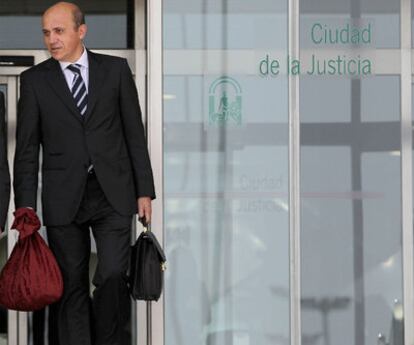Sevilla president jailed for fraud
José María del Nido sentenced to seven-and-a-half years in Minutas case
The Provincial High Court in Málaga on Monday sentenced Sevilla CF president José María del Nido to seven-and-a-half years in prison for his part in the embezzlement of public funds in the so-called Minutas case. Del Nido, a lawyer by trade, presented bills to the Marbella town authorities for legal work between 1999 and 2003 that was never carried out. He was sentenced for crimes of fraud, corruption and embezzlement and ordered to pay 2.7 million euros to Marbella Town Hall.
The former mayor of Marbella, Julián Muñoz, who was among more than 100 people tried in the Malaya case - the largest corruption investigation ever launched in Spain - was also sentenced to seven-and-a-half years for his involvement in the Minutas case. Del Nido acted as lawyer for Muñoz during the Malaya investigation.
Also jailed was former urban planning chief of Marbella, Juan Antonio Roca, another leading figure in the Malaya scandal. Six other people were also given jail terms, among them the directors of the associations that approved the fraudulent bills, Del Nido's former wife and assessors attached to the Marbella Town Hall.
The nucleus of the Minutas case is the network that permitted Del Nido to invoice 6.73 million euros for legal work to various municipal companies in Marbella between 1999 and 2003. He was hired by verbal agreement as a judicial adviser to former mayor Jesús Gil, the late president of Atlético Madrid, whom Del Nido knew through soccer circles.
At that time the Court of Auditors had started to take an interest in Marbella's books and Del Nido was hired to oppose any investigation by financial authorities. According to the public prosecutor, there are bills amounting to 1.6 million euros that correspond to legal work never undertaken.
Prosecuting lawyer Francisco Jiménez initially thought Del Nido had been an instrument at the service of Gil, who had also led a deep-rooted corruption network and made Marbella his personal fiefdom. However, in his final report, Jiménez stated that Del Nido had been part of the "hardcore group of decision-makers."
Therefore, the prosecution's jail petition was raised from 13 to 30 years on charges of embezzlement, corruption, fraud, falsification of documents, professional disloyalty and influence peddling. As well as his jail term, Del Nido faces being barred from practice for 44 years and from holding any sort of office for 15 years. The Sevilla president termed the court case "an inquisition."
"We wish to give our president all the greatest support possible. It is a tremendously unjust sentence that will not serve to remove Del Nido from the presidency of Sevilla because it is not a firm sentence but one that can be appealed," said Sevilla vice president José Castro.
Team coach Marcelino García said the outcome of the case would not "affect the performance of the professionals" at the club and offered his backing for the beleaguered Del Nido. "I hope he continues to be president of Sevilla for a long time and continues achieving success."
Del Nido has a long association with the club, having first joined the board as vice secretary in 1986. His father, also José María del Nido, was vice president in 1971. Del Nido took over the presidency in 2002 and immediately moved to clear up the club's debts of some 40 million euros. Under his tutelage, the club has won two UEFA Cups, two King's Cups and a European Supercup, while fostering players such as Sergio Ramos, Dani Alves, Javi Varas, Jesús Navas and José Antonio Reyes, among others.

Tu suscripción se está usando en otro dispositivo
¿Quieres añadir otro usuario a tu suscripción?
Si continúas leyendo en este dispositivo, no se podrá leer en el otro.
FlechaTu suscripción se está usando en otro dispositivo y solo puedes acceder a EL PAÍS desde un dispositivo a la vez.
Si quieres compartir tu cuenta, cambia tu suscripción a la modalidad Premium, así podrás añadir otro usuario. Cada uno accederá con su propia cuenta de email, lo que os permitirá personalizar vuestra experiencia en EL PAÍS.
¿Tienes una suscripción de empresa? Accede aquí para contratar más cuentas.
En el caso de no saber quién está usando tu cuenta, te recomendamos cambiar tu contraseña aquí.
Si decides continuar compartiendo tu cuenta, este mensaje se mostrará en tu dispositivo y en el de la otra persona que está usando tu cuenta de forma indefinida, afectando a tu experiencia de lectura. Puedes consultar aquí los términos y condiciones de la suscripción digital.








































